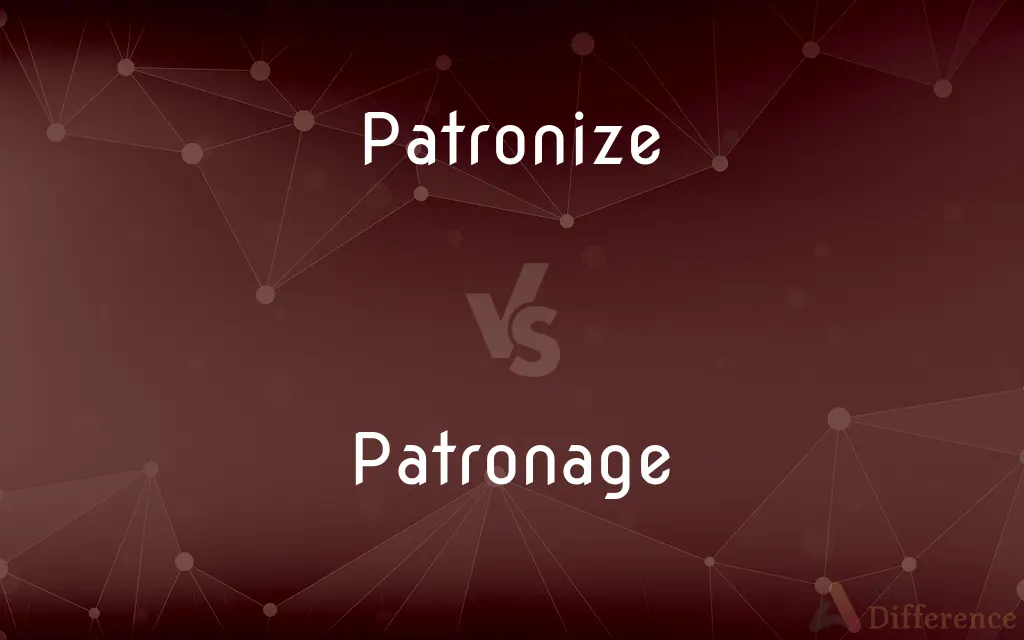Patronize vs. Patronage — What's the Difference?
By Urooj Arif & Maham Liaqat — Updated on March 17, 2024
Patronize often connotes a condescending attitude, implying superiority over the recipient, while patronage refers to the support or business given to a store, organization, or individual.

Difference Between Patronize and Patronage
Table of Contents
ADVERTISEMENT
Key Differences
Patronize, in its most commonly understood sense, involves treating someone with an apparent kindness that betrays a feeling of superiority. This could manifest in behaviors that seem helpful but are actually demeaning. On the other hand, patronage primarily denotes the support or financial backing provided to businesses, artists, or charitable organizations. This support is crucial for the survival and success of such entities.
While patronize can have a negative connotation, highlighting an unequal power dynamic where one party feels superior to another, patronage is generally seen in a positive light. It is often associated with loyalty and the nurturing of talent, businesses, or cultural institutions. Whereas patronage builds up, patronizing behavior can belittle and undermine.
In another sense, patronize can simply mean to be a customer of a business or an attendee of an event, devoid of any condescending overtones. In this context, it's akin to the act of patronage, where the focus is on the transactional relationship between a customer and a business. However, the underlying motivations and implications of the two can vastly differ.
Patronize, when used in a non-condescending way, aligns more closely with patronage, as both can involve providing support through business. Yet, the former can shift in meaning based on tone and context, while the latter maintains its association with support and sponsorship.
Despite their differences, both terms share a root in the idea of support. However, the manner and perception of that support diverge significantly. Patronize can either uplift or demean, depending on its use, while patronage consistently conveys a beneficial connection.
ADVERTISEMENT
Comparison Chart
Definition
To treat with an apparent kindness that betrays a feeling of superiority or to be a customer of.
The act of giving support to someone or something.
Connotation
Often negative, implying a condescending attitude.
Generally positive, implying support or business given.
Relationship Dynamic
Implies an unequal power dynamic, can be demeaning.
Implies a supportive or transactional relationship.
Context of Use
Interpersonal interactions, business customer context.
Business, arts, and charitable organization support.
Underlying Implication
Can either uplift or demean based on usage.
Consistently conveys beneficial support or connection.
Compare with Definitions
Patronize
To frequent a store, restaurant, or entertainment venue as a customer.
They patronize the local café every morning.
Patronage
The power to control appointments to office or the right to privileges.
His position was secured through political patronage.
Patronize
To treat with an apparent kindness that belies a feeling of superiority.
She detested the way her rich relatives would patronize her.
Patronage
Regular business given to a store, hotel, or the like, by a person or group.
The hotel's patronage has doubled this year.
Patronize
To support, encourage, or finance someone or something.
He patronizes several local artists.
Patronage
A condescending manner of supporting or approving something.
Her patronage of the new artists was not always well-received.
Patronize
To act as a patron or supporter of an event, cause, or individual.
Many celebrities patronize charity events for publicity.
Patronage
The support given by a patron.
The museum thrived on the patronage of art lovers.
Patronize
To adopt an air of condescension towards someone.
He has a manner that patronizes those he believes are intellectually inferior.
Patronage
Business or financial support provided to a business or institution.
Local patronage is vital for small businesses.
Patronize
Treat in a way that is apparently kind or helpful but that betrays a feeling of superiority
She was determined not to be put down or patronized
Patronage
Patronage is the support, encouragement, privilege, or financial aid that an organization or individual bestows on another. In the history of art, arts patronage refers to the support that kings, popes, and the wealthy have provided to artists such as musicians, painters, and sculptors.
Patronize
Frequent (a shop, restaurant, or other establishment) as a customer
Restaurants and bars regularly patronized by the stars were often crowded with paparazzi
Patronage
The support or encouragement of a patron, as for an institution or cause.
Patronize
To act as a patron to; support or sponsor
Donors who patronize the orchestra.
Patronage
Support or encouragement proffered in a condescending manner
Our little establishment has finally been deemed worthy of the bank's patronage.
Patronize
To go to as a customer, especially on a regular basis
We patronize the local diner.
Patronage
The trade given to a commercial establishment by its customers
Shopkeepers thanked Christmas shoppers for their patronage.
Patronize
To treat in a condescending manner, often in showing interest or kindness that is insincere
Felt she was being patronized by her supervisor.
Patronage
Customers or patrons considered as a group; clientele
The grand old hotel has a loyal but demanding patronage.
Patronize
(transitive) To act as a patron of; to defend, protect, or support.
Patronage
The power to distribute or appoint people to governmental or political positions.
Patronize
(transitive) To make oneself a customer of a business, especially a regular customer.
Patronage
The act of distributing or appointing people to such positions.
Patronize
(transitive) To assume a tone of unjustified superiority toward; to talk down to, to treat condescendingly.
Patronage
The positions so distributed or filled.
Patronize
To blame, to reproach.
Patronage
The right to grant an ecclesiastical benefice to a member of the clergy.
Patronize
To act as patron toward; to support; to countenance; to favor; to aid.
The idea has been patronized by two States only.
Patronage
The act of providing approval and support; backing; championship.
His vigorous patronage of the conservatives got him in trouble with progressives.
Patronize
To trade with customarily; to frequent as a customer.
Patronage
Customers collectively; clientele; business.
The restaurant had an upper-class patronage.
Patronize
To assume the air of a patron, or of a superior and protector, toward; - used in an unfavorable sense; as, to patronize one's equals.
Patronage
The act or state of being a customer of some business.
The restaurant had "Thank you for your patronage!" printed on its take-out bags.
Patronize
Assume sponsorship of
Patronage
A communication that indicates lack of respect by patronizing the recipient; condescension; disdain.
Patronize
Do one's shopping at; do business with; be a customer or client of
Patronage
(politics) Granting favours or giving contracts or making appointments to office in return for political support.
Patronize
Treat condescendingly
Patronage
Guardianship, as of a saint; tutelary care.
Patronize
Be a regular customer or client of;
We patronize this store
Our sponsor kept our art studio going for as long as he could
Patronage
The right of nomination to political office.
Patronage
The right of presentation to church or ecclesiastical benefice; advowson.
Patronage
(transitive) To support by being a patron of.
Patronage
(transitive) To be a regular customer or client of; to patronize
Patronage
Special countenance or support; favor, encouragement, or aid, afforded to a person or a work; as, the patronage of letters; patronage given to an author.
Patronage
Business custom.
Patronage
Guardianship, as of a saint; tutelary care.
Patronage
The right of nomination to political office; also, the offices, contracts, honors, etc., which a public officer may bestow by favor.
Patronage
The right of presentation to church or ecclesiastical benefice; advowson.
Patronage
To act as a patron of; to maintain; to defend.
Patronage
The act of providing approval and support;
His vigorous backing of the conservatives got him in trouble with progressives
Patronage
Customers collectively;
They have an upper class clientele
Patronage
A communication that indicates lack of respect by patronizing the recipient
Patronage
(politics) granting favors or giving contracts or making appointments to office in return for political support
Patronage
The business given to a commercial establishment by its customers;
Even before noon there was a considerable patronage
Patronage
Support by being a patron of
Patronage
Be a regular customer or client of;
We patronize this store
Our sponsor kept our art studio going for as long as he could
Common Curiosities
Is it negative to patronize a store?
No, in the context of being a customer, to patronize a store is simply to shop there regularly.
Can patronage be considered a form of investment?
Yes, in many cases, patronage is an investment in the success and future of the recipient, whether a business or an individual.
What does it mean to patronize someone?
To patronize someone often means to treat them with a kindness that suggests a feeling of superiority.
How does political patronage work?
Political patronage involves the giving of jobs and other advantages to friends and political allies as a reward for their support.
How can patronage positively affect a business?
Patronage can provide essential financial support, ensuring the business's sustainability and growth.
Can patronize be used in a positive way?
Yes, it can also mean to support or be a customer of a business or cause, without negative connotations.
What role does patronage play in the arts?
Patronage plays a critical role in the arts by providing financial backing and public exposure to artists and their work.
What is the difference between patronizing and supporting someone?
Patronizing can imply a condescending support, whereas supporting is generally positive and empowering.
Why is patronage important for artists?
Patronage allows artists to continue their work by providing them with financial support and encouragement.
What is a patron in the context of patronage?
A patron is someone who provides support, financial or otherwise, to a person, organization, or cause.
How do patronage and sponsorship differ?
Sponsorship is often more commercial and promotional, while patronage is generally more personal and based on support or loyalty.
How can one avoid being patronizing in communication?
By being respectful, listening actively, and avoiding assumptions of superiority over the person being addressed.
Is all patronage financial?
No, patronage can also consist of moral or advisory support, not just financial backing.
Can businesses also be patrons?
Yes, businesses can act as patrons by supporting initiatives, causes, or other businesses.
Why is it important to recognize patronage in the community?
Recognizing patronage encourages a culture of support and appreciation, vital for the growth and sustainability of various initiatives and businesses.
Share Your Discovery

Previous Comparison
Gecko vs. Lizard
Next Comparison
Enrich vs. EnrichenAuthor Spotlight
Written by
Urooj ArifUrooj is a skilled content writer at Ask Difference, known for her exceptional ability to simplify complex topics into engaging and informative content. With a passion for research and a flair for clear, concise writing, she consistently delivers articles that resonate with our diverse audience.
Co-written by
Maham Liaqat













































